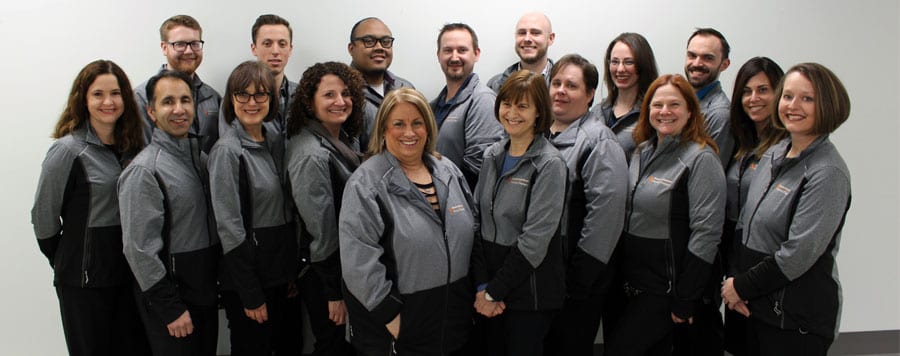Call (440) 449-3400 to Schedule an Appointment.
Balance Training
Balance issues can arise from various conditions or injuries and can become debilitating, increasing ones risk for falls or further injury. Balance Solutions is unique in our ability to incorporate balance training with all types of orthopedic, neurological and vestibular conditions to optimize results for our patients.
Our therapists combine balance training with orthopedic & sports rehab to improve joint proprioceptive and kinesthetic awareness as well as normalize gait mechanics and movement patterns, thus helping to prevent re-injury. Balance training plays an integral part in rehabilitation for our vestibular and neurological populations, improving stability with movement and facilitating proper balance strategies and gait patterns. Our therapists evaluate and treat the person as a whole, integrating specific balance exercises tailored to the individual, allowing us to achieve maximum functional gains for all conditions.
At Balance Solutions you will be evaluated by a skilled licensed physical therapist to determine factors contributing to your balance, such as; range of motion, muscle strength, joint mobility, soft tissue mobility, postural alignment, gait mechanics, abnormalities in movement patterns, body mechanics vestibular screening. A comprehensive assessment will be performed, utilizing multiple standardized tests and measures to compare your balance with age related norms. Following a thorough evaluation, a personalized plan of care with goals will be constructed specifically to meet your individual needs.
Balance
Balance is the ability to maintain your center of mass (body) within your base of support (between your feet) with minimal sway. In other words, balance is your ability to stand up straight without swaying or falling over. Balance is maintained by using visual, vestibular (inner ear), and proprioceptive input (sensory information sent to the brain from the muscles, joints, and skin).
As we age our vision changes effecting our ability to accommodate to the dark or tolerate glare. Glaucoma, cataracts and diminished contrast sensitivity decrease our ability to visually orient ourselves to our surroundings. Changes occurring in the ears sensory cells that are used for maintaining balance (vestibular system) can lead to dizziness or unsteadiness. Loss of muscle strength and decreased joint flexibility limit our motion and decrease our body’s ability to respond to a loss of balance. Nerves that carry proprioceptive input to the brain can also deteriorate with age and diseases, such as diabetes, decreasing our postural stability.
Problems in one or more of these systems may have a significant impact on your ability to maintain balance, increasing your risk for falling. Not all changes that occur to our bodies as we age are caused by disease, injury or direct results of aging. Many of these changes are caused by inactivity, poor diet, smoking and lack of exercise.
Specialized exercises can improve the ability to maintain your balance. As everyone is different, the issues that may contribute to decreased balance can vary widely. Balance Solutions therapists provide a thorough evaluation, screening for all factors which may contribute to balance and gait deficits. Thorough screening allows the therapist to develop a specialized treatment plan with specific exercises to treat you effectively.
Balance Exercises
Balance exercises can range from simple exercises such as standing on one foot or standing on foam, to more complex exercises such as walking on a compliant surface while tossing a ball from one hand to the other while tracking it with your eyes and performing a concentration activity (say the alphabet backwards) all at the same time. The type of exercise designed for you depends on your age, activity level, impairments, personal goals and previous level of function.
Balance exercises incorporate vision, vestibular (inner ear), and proprioceptive function to improve sensory integration (your ability to use all senses to maintain balance). Functional strengthening exercises and core stabilization exercises are also incorporated to make sure you have the appropriate strength to regain your balance when needed.
Balance Rehabilitation is good for anyone experiencing difficulties with balance, and who have conditions that may result in balance deficits, such as:
- History of falls or fear of falling
- Dizziness or vestibular disorders
- Cervicogenic dizziness
- Orthopaedic injuries
- Osteoarthritis of the hips, knees or ankles
- Post-operative hip, knee, or ankle surgeries
- Post concussive disorders
- Post stroke
- Parkinson’s
- Multiple sclerosis
- Scoliosis or abnormal posture
Call today for more information or to schedule a comprehensive evaluation today!
Our Therapists
BALANCE SOLUTIONS PHYSICAL THERAPY
Our therapists specialize in many different aspects of physical therapy; working together to maximize functional gains for our patients. Balance Solutions believes in providing continual opportunities for professional growth and educational advancement.
Our therapists are trained in-house and participate in regularly scheduled in-services training as well as hands-on continuing educational courses to advance their knowledge and skills. Our staff trains as a team, all therapists can perform similar techniques with slightly different styles to accommodate the many types of patients seen at Balance Solutions. We practice what we teach, several of our therapists travel the country teaching these methods to other therapists and facilities.

Contact Balance Solutions
"*" indicates required fields

